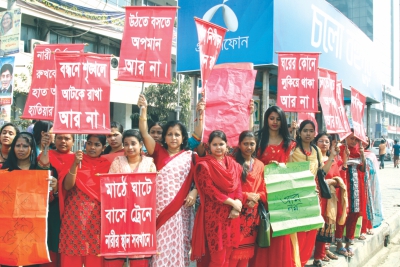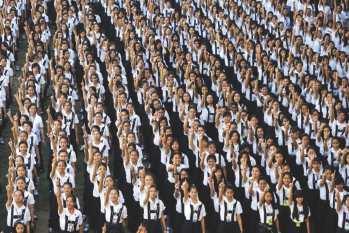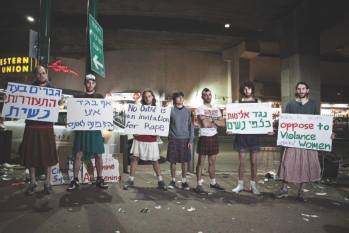| Home - Back Issues - The Team - Contact Us |
 |
| Volume 12 |Issue 08| February 22, 2013 | |
|
|
Event
Real Men Don't Rape Soraya Auer The count to see whether one billion men and women actually 'rose up' last week on February 14 to support One Billion Rising (OBR), a global campaign to end violence against women, is yet to be determined. What is glaringly evident, however, is that this is the one and only campaign to have inspired almost simultaneous action in 203 countries. School girls in white uniforms and pigtails, raised their forefingers up in the air to show their solidarity with the one in three women subjected to violence – one billion of the world's population – and said 'Enough' and 'No More'. This was a scene in the Philippines, Bangladesh, Ethiopia and many more places on February 14, 2013, otherwise known as Valentine's Day and the 15th anniversary of V-Day, an activist movement to end violence against women and girls. The groundbreaking day calling for one billion men and women to 'Strike, Dance, Rise' against violence against women and girls, saw singing, dancing, marching and standing on streets take place in 203 countries.
The world seemed ready and desperate for V-Day and One Billion Rising (OBR), its global campaign, brainchildren of Eve Ensler, an award-winning American playwright and prominent activist. It was only two months ago that the world was shocked at the brutal gang-rape and death of an Indian woman, which sparked unprecedented nationwide protests. Men and women in Bangladesh were also inspired to protest against the gang-rapes of teenaged girls in Tangail and Rangamati. What once began as the celebrated writer's way to raise money for New York organisations fighting violence against women has turned into a “feminist tsunami” sweeping across the world. During Ensler's visit to Bangladesh last month she remarked how the campaign had grown bigger than her. “Oh my god, it has nothing to do with me anymore,” Ensler told the Star in an exclusive interview. “I just feel like my job is to fan the coals, fan that fire and be there to support the amazing women everywhere who are doing unbelievable work in every country.” Since last year, Ensler has toured over twenty countries to stoke the flame to end violence against women in both developed and less developed countries. On the historic climax of OBR, the author of The Vagina Monologues stood alongside hundreds of women in the Congo's City of Joy, a safe centre she established for survivors of rape and atrocities inflicted by armed militias in Bikavu, Eastern Congo – considered the rape capital of the world and the worst place on earth to be a woman. OBR's architect told her twitter following the response to the day was beyond her wildest dreams. “This has been one of the most beautiful days. It has been massive,” she said to The Guardian. In Cairo, women danced despite being afraid of backlash from religious clerics. In Iran's capital of Tehran, men and women gathered privately for a performance of The Vagina Monologues in Farsi while men in Israel wore short and long skirts to make the point that clothing doesn't invite rape. More than 200 events were planned in the UK and 380 events over 66 districts of Bangladesh. Flash mobs popped up in their millions, on streets, in train stations, shops, outside famous monuments, and on some of the world's most beautiful beaches. In Florida, successful immigration lawyer Kara Ferrier, who immigrated to the US from Haiti ten years ago when she was 17, gave an inspirational speech to an OBR gathering saying, “You can help. Because of your knowledge, because of your education and experience you can help elevate another woman.” Texas' Republican-controlled legislature, during the three-hour event held outside the capitol, were acutely aware of a mass chanting of “vagina!” On the other side of the world, in Indonesia, not even torrential downpour could stop a crowd from gathering in Jakarta or from growing by curious spectators encouraged to join in the rain dance. Women wearing pink and red in Poland overwhelmed Warsaw Central railway station with their One Billion Rising flash mob.
Photos swarmed the internet with how the world was celebrating V-Day and demanding an end to violence against women. Break-dancing men entertained crowds in the Maldives while Italian women had a flash mob in front of their capital's historic Colosseum. More than 40 events were planned in New York City alone and government officials, celebrities and taxi drivers alike showed their support for the global rising. Women performed traditional dances in Ankara, Turkey – a country proud to have given women the vote before France but still plagued with stories of honour killings and honour suicides. A traffic officer abandoned his duties temporarily to dance with activists on the streets of Lagos, Nigeria. Women with their heads covered in – to name a few – Somalia, Lebanon, Morocco, and India gathered in crowds with their arms raised up and out, singing, chanting and again, adding their voices to the call for an end to violence against women and girls. Supporters of OBR in India wore head bands, much like the ones seen worn at Shahbag in Dhaka, and across the large nation, Bollywood stars, activists, and domestic workers took to the streets. Musician Anoushka Shanker, daughter of the legendary sitarist Ravi Shankar, chose the day to reveal to the world she'd been sexually abused as a child at the hands of a man her parents trusted. While song and dance featured in most countries of the world, there were some places that chose to express themselves differently. In Cape Town, South Africa, a silent protest was held in support of rape victims with posters like “Heroes will hear us”. On a university campus in Gwalior, India, 3,939 students formed the Venus symbol in an attempt to claim the record for the largest female gender sign. Activists covered their mouths for a flash mob gathering in Singapore and women on the streets of Kabul, Afghanistan said marching and shouting “enough violence, we want peace” and “death to any enemy of women's rights” towards their Parliament was a big step for them. “It's not in Afghan culture to sing and dance,” said 26-year-old Nasima Omari to a Guardian correspondent. “For us, walking in the streets is in itself an issue of security.” Fortunately for the cause, as many men as women joined the crowd, which was heavily guarded by Afghan police, wielding riot shields and Kalashnikov rifles. “As an Afghan man, I want to be here to show other Afghan men that violence against women is wrong and it has to end,” said 25-year-old Tamim Shamal. The day was indeed massive. In Bangladesh, you might have noticed the human chains that were formed out of thin air by people walking out of their offices and homes a minute before the nationwide call to stand together at 1pm. The long road of Gulshan Avenue in the capital was a remarkable sight with men, women and children representing both the private and public sectors in the area. Men were just as prominent in red as the women around them, and even led the crowd in chanting “silence about violence... no more, no more!” and “fear and oppression... no more, no more!” News reports estimated in the areas of Mohakhali and Gulshan 12,000 people gathered to demand an end to violence against women and girls. The OBR Bangladesh team currently claim that 2.7 million men and women rose up in Bangladesh – an overwhelming and exciting number if true. Not to put a dampener on such an impressive global effort to draw attention to the issues facing women and girls but the real results of this movement are yet to be seen. The Home Minister recently revealed in Parliament that 50,000 women were victims of repression in Bangladesh over the past four years. Of them 19,422 incidents occurred only last year. Only some 900 perpetrators were punished in cases of acid-throwing, rape, abduction and other crimes. Human rights' activists and organisations believe that while women are slowly becoming aware of their rights and are reporting their abuses more, there are still many cases of violence that go unreported. Men's attitudes towards wife beating were captured statistically in 2004. In rural areas 51.6 percent support that a wife could be beaten if she goes out without telling her husband, 18.2 percent if she neglects the children and 30.1 percent if a wife argues with her husband. Urban men are marginally better with 39.1 percent agreeing a woman can be beaten if she leaves the home without permission, 11.4 percent if she neglects the children and 19.8 percent if she argues with her husband. Such ways of thinking will take more than one day of human chains, rallies and performances to change and ensure there is an end to violence against women and girls. But with global pressure supporting the cause, One Billion Rising is an extraordinary precedent. Now we will have to live up to it by taking the fight forward and ensuring the school girls who joined the campaign are not future victims.
|
||||||||||||
Copyright
(R) thedailystar.net 2013 |



